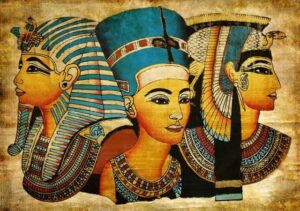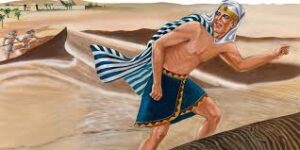Moses Fled From Pharaoh and Went to Live in Midian
2: 11-15
Moses fled from Pharaoh and went to live in Midian DIG: Why does Moses feel the way he does about the Hebrews? Why does he flee? What character traits do you see in Moses when he lived in Egypt? Which ones will serve him well in the long run? Which get him into trouble again?
REFLECT: How do you feel about God using a murderer to further His plans? How might God use a personal flaw or failure of yours for His greater glory?
The first thirty-five years of Moses’ life were spent in the courts of Egypt. He was raised and trained like an Egyptian. He looked like an Egyptian, talked like an Egyptian and acted like an Egyptian. He was educated in the great Temple of the Sun, which was the outstanding university of the day. They had an outstanding library there, and we are told that Moses was educated in all the wisdom of the Egyptians (Acts 7:22). But the one great lack in his education was that he was not taught how to serve ADONAI.21

Thirty-five years after Moses was brought into the house of Pharaoh, Thutmose III had taken control of the throne because Hatshepsut had died. He was the fourth Pharaoh of the Eighteenth Dynasty. He was probably about thirty at the time and had grown up hating Hatshepsut and anyone associated with her. Not only was Moses Hatshepsut’s adopted son, but he was royalty and an indirect heir to the throne. As long as Hatshepsut was alive, Moses was in safe hands. But after her death, Moses no longer had the protection of his adoptive mother. Therefore, Thutmose III set out on a campaign to kill him.
Thutmose III was perhaps the greatest of all the so-called Warrior Pharaohs. He evidently undertook seventeen victorious campaigns. This Pharaoh was a natural leader and general. He made unpopular military decisions that proved to be correct. He planned his attack in such a way that he always had the high ground and left his enemy at a disadvantage. In fact, Thutmose III has been called the Napoleon of Ancient Egypt, and was feared both inside and outside of the land.
Despite the education that Moses received in the courts of Egypt, he could not get rid of the belief that he belonged to the people of Isra’el. One day, Moses went out to where his own people were and watched them at their hard labor. It seemed that Moses made a conscious decision to change his lifestyle and identify with his own people after the death of his adoptive mother Hatshepsut. Stephen comments on this incident: When Moses was forty years old, he decided to visit his fellow Israelites. This was not a casual visit to see how they were doing. His adopted mother was dead and he probably knew that Thutmose III would try to kill him, so there was nothing left for him in Egypt. He saw one of his own people being mistreated by an Egyptian overseer, so he went to his defense and avenged him by killing the Egyptian and hiding him in the sand. This was a turning point in his life. Moses thought that his own people would realize that God was using him to rescue them from slavery, but they did not (Acts 7:23-25). He would indeed rescue them from slavery, but God’s timing would not come for another forty years.
By faith, Moses, when he had grown up, refused to be known as the son of Pharaoh’s daughter. The Greek tense from the Septuagint here is an aorist tense, which means it was a once and forever act. He made a once and forever decision not to be known as the son of Hatshepsut. There is nothing to suggest that he did not love his adopted mother, but Egypt was dead to him. It was probably at that point that he shortened his name. He had no intention of contending for the Egyptian throne and he chose to be mistreated along with the people of God rather than enjoy the pleasures of sin for a short time. He understood that the Messiah would be fulfilled through the nation of Isra’el; therefore, he regarded the disgrace on behalf of the Messiah as of greater value than the treasures of Egypt, because he was looking ahead to his reward. By faith he left Egypt, not fearing the king’s anger; he persevered because he saw Him who is invisible (Heb 11:24-27).
Somehow he knew that the Hebrew slaves were the ones that ADONAI, or God, would use to bring about the Jewish Messiah, who at His Second Coming, would set up a far greater Kingdom than that of the Egyptian empire. So it was a conscious act on the part of Moses. He intuitively knew God’s program. He knew God was going to use Isra’el and get them out of Egypt, and he also knew he was the instrument to be used. Perhaps this was from his own mother because she recognized that he was a special instrument of God (Acts 7:20). However, while Moses understood God’s program, he didn’t understand God’s timing.
When Moses killed the Egyptian overseer, the only ones present were the Jews. He expected that it would have been kept a secret. However, he was about to learn a bitter lesson. The next day he went out and saw two Hebrews fighting. He asked the one in the wrong, “Why are you hitting your brother” (2:13)? The man replied mockingly: Who made you ruler and judge over us? This reaction foreshadowed the relationship between Moses and the entire nation of Isra’el. Here the man questioned Moses’ authority – why, he was no more than the son of a Hebrew slave. Who was he to lord it over his fellow Hebrews?22 Then he sarcastically asked: Are you thinking of killing me as you killed the Egyptian? That shook Moses to the core because he realized that in one day the word had gotten out about what he had done. Then Moses was afraid and thought to himself, “What I did must have become known” (2:14). At that time he knew that his offer to rescue his own people from slavery had been rejected.

When Thutmose III heard of this from the Hebrews he tried to kill Moses, but Moses fled from Pharaoh and went to live in Midian, where he sat down by a well (2:15). Wells were important for shepherds and semi-nomadic people. It was quite natural that Moses would be drawn to a well, not only for the physical sustenance, but because it was the meeting place for shepherds and travelers.23
As far as Moses was concerned, he understood that normally those of the royal household could kill anyone they wanted to without penalty. Except that now with Hatshepsut dead, Thutmose III was looking for a way to kill him. So when Moses killed the Egyptian overseer, the king of Egypt had his excuse. Moses then fled to live in Midian, not because he was afraid of Pharaoh, but because his own people did not realize that God was using him to rescue them from slavery (Acts 7:25). His forty years in Egypt were over. All of his education in Egypt did not prepare Moses to deliver his people. However, ADONAI would prepare Moses in the land of Midian to be the deliverer of God’s people, Isra’el.



Leave A Comment